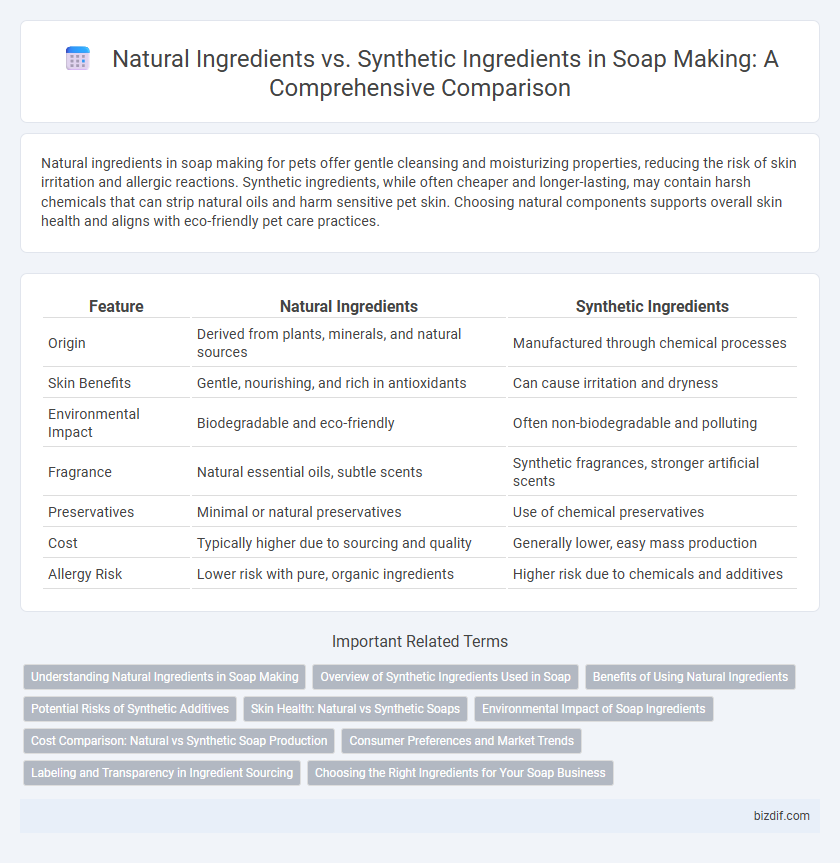Natural ingredients in soap making for pets offer gentle cleansing and moisturizing properties, reducing the risk of skin irritation and allergic reactions. Synthetic ingredients, while often cheaper and longer-lasting, may contain harsh chemicals that can strip natural oils and harm sensitive pet skin. Choosing natural components supports overall skin health and aligns with eco-friendly pet care practices.
Table of Comparison
| Feature | Natural Ingredients | Synthetic Ingredients |
|---|---|---|
| Origin | Derived from plants, minerals, and natural sources | Manufactured through chemical processes |
| Skin Benefits | Gentle, nourishing, and rich in antioxidants | Can cause irritation and dryness |
| Environmental Impact | Biodegradable and eco-friendly | Often non-biodegradable and polluting |
| Fragrance | Natural essential oils, subtle scents | Synthetic fragrances, stronger artificial scents |
| Preservatives | Minimal or natural preservatives | Use of chemical preservatives |
| Cost | Typically higher due to sourcing and quality | Generally lower, easy mass production |
| Allergy Risk | Lower risk with pure, organic ingredients | Higher risk due to chemicals and additives |
Understanding Natural Ingredients in Soap Making
Natural ingredients in soap making include essential oils, plant-based oils, butters, and clays that offer gentle cleansing and nourishing properties without harsh chemicals. These components retain antioxidants, vitamins, and minerals that support skin health and provide a more eco-friendly and biodegradable alternative to synthetic substances. Emphasizing natural ingredients enhances soap quality by maintaining skin hydration, reducing irritation, and promoting sustainable, chemical-free formulations.
Overview of Synthetic Ingredients Used in Soap
Synthetic ingredients in soap making include surfactants like sodium lauryl sulfate, which create lather and remove oils effectively. These compounds are often derived from petrochemicals, providing consistent quality and longer shelf life compared to natural alternatives. Common synthetic additives also include preservatives, colorants, and fragrances designed to enhance performance and aesthetic appeal.
Benefits of Using Natural Ingredients
Using natural ingredients in soap making enhances skin health through gentle cleansing and hydration, as they contain vitamins, antioxidants, and essential oils that nourish and protect the skin. Natural components like shea butter, coconut oil, and olive oil support eco-friendly practices by being biodegradable and free from harmful chemicals often found in synthetic alternatives. This reduces the risk of allergic reactions and irritation, making natural soaps ideal for sensitive skin and promoting sustainable skincare routines.
Potential Risks of Synthetic Additives
Synthetic additives in soap making pose potential risks such as skin irritation, allergic reactions, and exposure to harmful chemicals like parabens and sulfates. These substances can disrupt the skin's natural barrier and contribute to dryness or sensitivity over time. Natural ingredients reduce these risks by providing gentle, biodegradable alternatives that support skin health.
Skin Health: Natural vs Synthetic Soaps
Natural soaps, crafted from plant-based oils and essential oils, offer superior skin health benefits due to their rich moisturizing properties and absence of harsh chemicals. Synthetic soaps often contain detergents and artificial fragrances that can strip natural oils, leading to dryness and irritation, especially for sensitive skin. Incorporating natural ingredients such as shea butter, coconut oil, and aloe vera enhances skin nourishment and supports a balanced skin microbiome.
Environmental Impact of Soap Ingredients
Natural ingredients in soap, such as essential oils, plant-based oils, and herbs, typically biodegrade faster and have a lower environmental footprint compared to synthetic chemicals. Synthetic ingredients, including sulfates and artificial fragrances, often contain petrochemicals that persist in water systems, causing pollution and harming aquatic life. Choosing soaps with natural components supports sustainability by reducing chemical runoff and promoting eco-friendly production methods.
Cost Comparison: Natural vs Synthetic Soap Production
Natural soap production typically incurs higher costs due to the use of organic oils, herbs, and essential oils, which often require sustainable sourcing and more labor-intensive processing. Synthetic soap ingredients like detergents and artificial fragrances are generally less expensive to produce and procure, allowing for lower overall manufacturing costs. The price difference reflects the trade-off between premium, eco-friendly formulations in natural soaps and the cost-efficiency of synthetic alternatives in mass production.
Consumer Preferences and Market Trends
Consumers increasingly prefer natural ingredients like essential oils, shea butter, and coconut oil in soap making due to their perceived health benefits and eco-friendliness. Market trends indicate a significant rise in demand for organic and sustainably sourced components, aligning with the growing awareness of chemical sensitivities and environmental impact. Synthetic ingredients remain popular for their affordability and extended shelf life but face declining favor among health-conscious buyers seeking transparency and natural formulations.
Labeling and Transparency in Ingredient Sourcing
Clear labeling and transparency in ingredient sourcing are essential in soap making to help consumers distinguish between natural and synthetic components. Natural ingredients such as essential oils, plant-based glycerin, and organic herbs are often highlighted on labels to emphasize purity and eco-friendliness, while synthetic ingredients like parabens or artificial fragrances are typically disclosed to inform about potential allergens or irritants. Prioritizing ingredient transparency not only builds consumer trust but also aligns with growing demand for ethical and sustainable soap products.
Choosing the Right Ingredients for Your Soap Business
Selecting the right ingredients for your soap business involves balancing the benefits of natural ingredients like essential oils, plant-based oils, and butters, which appeal to eco-conscious consumers, with synthetic ingredients that offer cost efficiency, longer shelf life, and vibrant colors. Natural ingredients provide moisturizing and skin-soothing properties, enhancing product value for sensitive skin markets, while synthetic components enable consistent quality and scalable production. Understanding your target market's preferences and product goals ensures an optimal blend for profitability and brand identity.
Natural Ingredients vs Synthetic Ingredients Infographic

 bizdif.com
bizdif.com